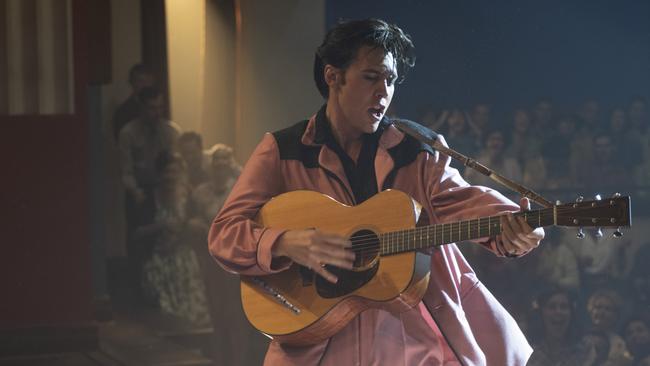Elvis: Must-see movie has sets, drugs and rock ’n’ roll
The new pop biopic from director Baz Luhrmann plunges, early on, into a morphine dripper and does not ever, realistically, tonally, return.

It’s the morphine, silly. It’s all about the morphine. This new pop biopic from director Baz Luhrmann plunges, early on, into a morphine dripper and does not ever, realistically, tonally, return.
The opioid is pulsing into the arm of the infamous music manager Colonel Tom Parker, played by Tom Hanks under gallons of latex as a cross between Rumpelstiltskin and Fat Bastard from Austin Powers.
It’s 1997, and Parker is on his deathbed, and setting the record straight about his relationship with his most famous client. “I did not kill Elvis,” he says, via Hanks’s impish cod-European delivery (Parker was Dutch, Hanks does Franco-German). “I made Elvis!” And, whoosh, another shot of morphine and down we go, into the pipe, for an explicit visual metaphor this film will be a mind-altering, pleasure-filled, rock’n’roll fever dream. And at several points in what is easily Luhrmann’s best movie since Romeo + Juliet, it really is.
Credit here must go to its breakout star, Austin Butler, as the King. The 30-year-old actor has risen to the near-impossible task of emulating Elvis with gobsmacking aplomb. It’s a version that goes beyond imitation into something much more dangerous. During several stunningly realised set-piece numbers (including That’s All Right, Heartbreak Hotel, Suspicious Minds) Butler’s Elvis seems almost physically possessed.
He does the swivelling hips routine, but he also brings an abandon to the performance, as well as vocal stylings (the actor’s singing, without digital manipulation, is pitch-perfect), that suggests something much more elemental. Luhrmann stages an early Elvis performance of That’s All Right, in 1955, as a disturbing Dionysian event, where suddenly unleashed teenage girls appear desperate, teeth bared, to tear their idol apart. Elvis knows it.
The power in the musical numbers is drawn from Butler’s turn but also from Luhrmann, who edits with the kind of frenetic rhythms that are almost impossible to resist (feet will tap). They are the spine-tingling highlights that make the entire project a must-see movie.
The material around the numbers is inevitably not quite as compelling. The woozy yet cursory skip through the life of Presley is thematically justifiable (remember the morphine!) but can feel shallow. The only substantial characters in the film are Elvis and Parker, with Priscilla (Olivia DeJonge) reduced to second banana.
It hardly matters. Luhrmann has never been a great dramatist. He has the instincts of a pop video supremo. And in the pop god Elvis Presley he may have found his perfect subject.
The Times



To join the conversation, please log in. Don't have an account? Register
Join the conversation, you are commenting as Logout